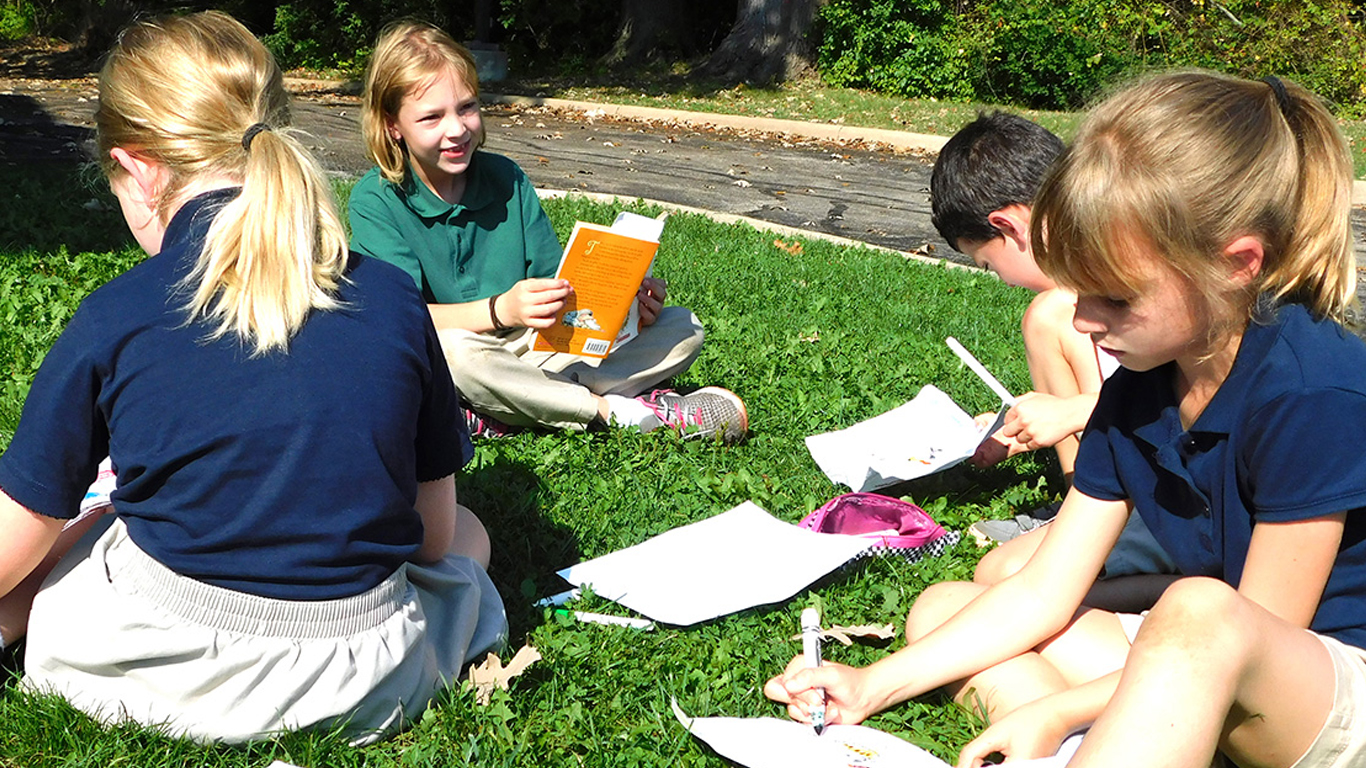C.S. Lewis eloquently summarizes my love for great literature in his book An Experiment in Criticism, “The best safeguard against bad literature is a full experience of good; just as a real and affectionate acquaintance with honest people gives a better protection against rogues than a habitual distrust of everyone.” This is what a classical Christian education gave me: the tools to safeguard against the lies that the world offers, and an opportunity to participate in the Great Conversation. The Great Conversation is the ongoing process of writers and thinkers referencing, building on, and refining the work of their predecessors.
Some parents may think, after understanding what a classical Christian education is, why is it so beneficial? Isn’t a Christian education sufficient for the welfare of the child? I will argue an emphatic “no” in this article and seek to explain so through the academic benefits, spiritual benefits, and personal benefits I have received from a classical Christian education.
First, the trivium in classical Christian education is multifaceted. It can be used for several different purposes in education. Etymologically, the Latin word trivium means “the place where three roads meet”. These three “roads” are grammar, logic, and rhetoric. Grammar is the “ABC’s” of a subject, logic is the “why” behind the subject as well as a defense of, and rhetoric is the capstone in which a subject is fully understood and articulated winsomely. The trivium can be used in an individual concept, within a subject as a whole, and also for the understanding of child development.
The trivium can be applied to a single subject. For example, my third graders memorize the ABC’s of their multiplication table (grammar), then they articulate that 3 x 2 means three groups of two, adding three two times (logic), and finally they can complete multiplication problems with two digits (12×15) and explain the process as they complete the problem (rhetoric).
The trivium can be applied to a larger subject area. Sticking with math, in the grammar stage students memorize addition, subtraction, multiplication, and division facts as the foundation of mathematics, along with basic math principles. In the logic stage, the students move on to more complicated math learning the “why” of math in algebra and syllogisms in geometry, and finally in the rhetoric stage all principles previously learned in math are applied.
Finally, the trivium is applied to child development. Children in the grammar stage (grades K-6) are excellent at memorization. They memorize math facts, timelines, grammar jingles, all with joy. Children in the logic stage (grades 7-9) become interested in the “why” questions behind what they have learned and learn how to present arguments intelligently. The rhetoric stage (grades 10-12) is the capstone of learning in which students speak and write on works of literature, history, apologetics, and so on. The trivium not only complements the academic development of a child, but also enhances spiritual development of the child.
Left alone, the trivium without Christianity is sorely lacking. Without the death and resurrection of Jesus Christ, knowledge is futile. After all, our love of creation is a holy use of our intellect for God’s glory. Classical Christian education offers Biblical integration throughout all subject areas. At a classical Christian school Biblical integration is not simply Bible class and chapel, but teachers implement sacramental practices in their classrooms such as prayer, worship, service, and scripture memorization. Classical Christian teachers teach under the umbrella that “all truth is God’s truth”, and to study the creation that God redeems in the resurrection of His son Jesus Christ. Such Biblical integration in science, math, history, etc. develops intelligent men and women prepared to fulfill what Jesus prayed to his Father in John 17, “As you sent me into the world, so I have sent them into the world.” Classical Christian education offers personal discipleship of the student by their teacher who prays for and exhorts them in the way they should go. The trivium, Biblical integration, and personal discipleship enable students to love the Lord with both their mind and soul as they go out into the world and seek the welfare of the city in which they live.
St. Augustine says in book two of his On Christian Teaching, “A person who is a good and true Christian should realize that truth belongs to his Lord, wherever it is found, gathering and acknowledging it even in pagan literature.” Some parents look at me quizzically when I tell them that I teach Greek mythology in third grade. Why teach such pagan literature? The answer is that my students are to find truth, wherever it may be found. They learn to articulate the terms polytheism vs. monotheism and learn to pick out Christian virtues found in Greek mythology (there are many!). Virtues in story, myth, and heroes are all found in such works, as well as much pagan literature of the Great Tradition. For example, Athena, the goddess of wisdom, is a just and good goddess who protects and respects those around her, whereas Ares, the god of war loves bloodshed and is portrayed as unintelligent and a crybaby. Naturally, my students would rather be an “Athena” than an “Ares”. Even though I don’t believe in Plato’s religious philosophy, his Allegory of the Cave portrays a Christian principle of salvation and coming out of darkness into light.
Learning the Great Tradition (primary texts in the canon of great literature) and participating in the Great Conversation taught me how to thoughtfully engage in culture, loving the Lord with my mind. I can now intelligently reflect on presidential debates, criticize arguments of pop culture, and weigh the theology presented by my pastor. Classical Christian education equips students to become lifelong learners who as adults seek the welfare of their cities, intelligently present and defend the gospel, and practice thoughtful criticism of the postmodern world in which they live. Classical Christian education reflects God’s character of bringing order out of chaos. In a world where virtue is called vice and vice virtue, students are given the academic, spiritual, and social tools to engage the world with the mind of Christ through completion of the trivium, Biblical integration, and personal discipleship.







